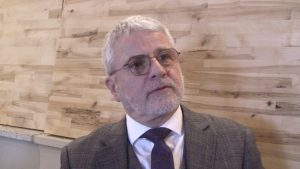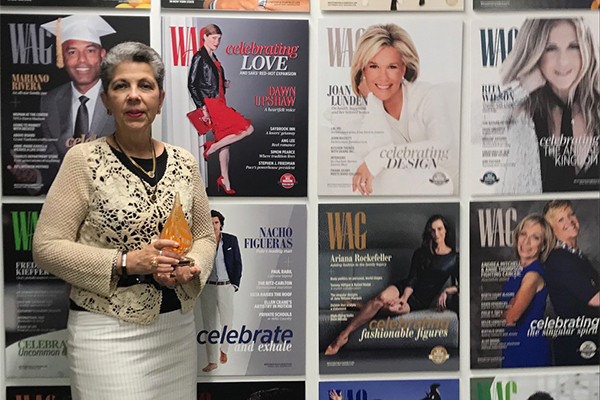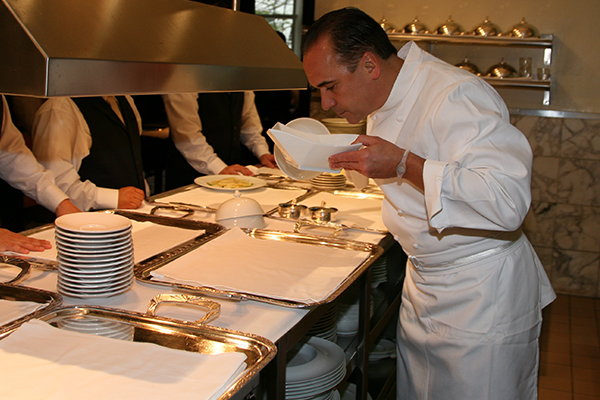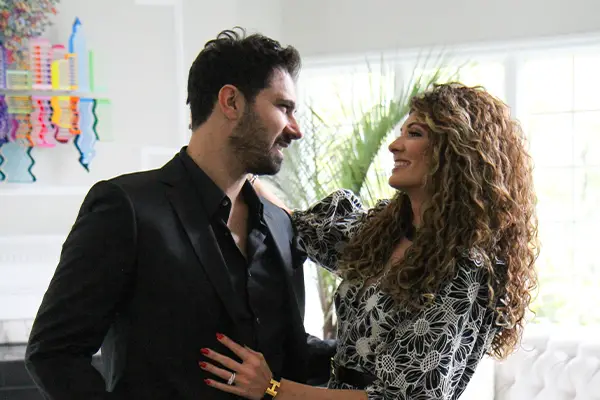
Whether the subject is soccer, teaching, leadership, dressing up for Purim as Elton John or the pastrami and corned beef sandwiches at Greenwich & Delancey, a kosher delicatessen in Cos Cob where we meet for lunch, Anthony R. Davidson, Ph.D., offers a playful sense of humor and a passionate sense of purpose.
They”™re qualities he brings to his role as dean of the School of Professional and Continuing Studies (PCS) at Fordham University, whose Jesuit values, he says, dovetail with his Orthodox Jewish ones and his progressive approach to education. (On July 1, Tania Tetlow, J.D., a former law professor and current president of Loyola University New Orleans, will succeed the Rev. Joseph M. McShane, S.J., as Fordham president ”” the first layperson and the first woman in the post in the university”™s 181-year history.)
She will lead a university ”” based in the Bronx but with campuses at Lincoln Center and in Westchester County ”” that has become increasingly global in this century. Fordham had already been offering programs in London for 15 years when in 2018 it opened the new Fordham London Centre. Fordham”™s partner programs include one with Oxford University.
Davidson himself offers another tie with the mother country. He arrived in the United States from his native England in the 1970s to teach soccer, whose life lessons have served him through various degrees (a bachelor”™s in marketing, magna cum laude, and an M.B.A. in business policy and finance from the Bernard M. Baruch College of the City of New York, a doctorate in management and systems science from Cass Business School of the City University of London); the co-founding of the New York public relations and advertising firm Perfect Impression in 1980; and an academic career that has taken him from Baruch to Hofstra, Polytechnic, Adelphi, Yeshiva and New York universities and then on to dean at the School of Business at Manhattanville College in Purchase.
Prior to our luncheon, we emailed him a few questions about Fordham”™s School of Professional and Continuing Studies, the Real Estate Institute he”™s founded there and the role that the environment and leadership, a favorite subject, play in both:
Dean Davidson, you became dean of Fordham University”™s School of Professional and Continuing Studies (PCS) in 2016 and have since founded its Real Estate Institute. Why real estate?
“Real estate is a ubiquitous, essential component of our life as it affects us all as we work, live, learn, worship and play in real estate.
“Recent global megatrends ”” including emerging economies, fast-growing cities, technological innovation and sustainability ”” are changing the real estate investment and development landscape. As our society rethinks the future of our cities, work areas and living arrangements, the need and demand for professionals educated in real estate will be enormous.
“Although real estate has been the subject of academic as well as professional interest over a long span of time, perhaps centuries, scholarly attention has intensified significantly with the growth of institutional investment in this asset class, which represents a significant portion of the world”™s wealth. So, not only is real estate of enormous importance to the world”™s wealth, but it affects the daily lives of our society and students. By offering programs in real estate and construction, we can make a major impact, sending future leaders out into the workforce who will create value and improve the existing skyline.
“And in recognition of the multidisciplinary nature of real estate ”” in which professional practice requires a working knowledge of real estate finance, investment, law, development, construction, management, urban planning, architecture, statistical analysis and operations ”” we believe PCS, with its inherent multidisciplinary approach to education, is the most appropriate home for the REI.”
What does the institute offer students?
“The REI offers students cutting-edge academic and applied analysis, as well as the critical thinking and decision-making skills to compete in the global real estate and construction marketplace. By offering a comprehensive range of undergraduate, graduate and noncredit programs, students can choose their desired level of study and industry area to develop competencies essential for success and leadership.
“With input from industry thought leaders on the REI Executive Advisory Council, the programs offer an array of multidisciplinary learning opportunities that focus on experiential learning and help build lasting industry connections. An integral part of the REI experience is its Fordham REI Student Association and its mentorship program, which offer students the opportunity to supplement classroom learning with extracurricular networking activities and the counsel of a respected industry mentor. As part of Fordham”™s School of Professional and Continuing Studies (PCS), REI understands that an interdisciplinary approach to curriculum and instruction provides students with optimal learning opportunities. As a result, we present professional development programs covering the spectrum of career tracks and disciplines within the commercial real estate industry.”
How then does this translate to the workplace?
“The focus of our programs is on development, financing, investment and construction as they pertain to real estate. Employment opportunities for graduates are extensive, with the number of persons directly employed in real estate (including commercial construction) exceeding 4.5 million, and several million others in related fields, including law, accounting and financial derivatives based on real estate. With total ”˜institutional grade”™ real estate now amounting to more than $6 trillion and perhaps an additional $4 trillion in more entrepreneurial real estate assets, the degree of sophistication required in this field is becoming increasingly advanced.
“As a result, the demand for individuals with the right skill set will only grow. REI”™s programs provide that enhanced educational experience, including a sophisticated skill set that, along with our networking and mentoring opportunities, enables our graduates to advance in their current careers or transition into their own businesses.”
You oversee programs for adult and nontraditional students. Tell us about some of the other courses and certifications PCS offers.
“PCS offers programs for people who are looking to improve their credentials and update their skills or who wish to reinvent themselves completely. We began as a school for adults who were looking to finish their bachelor”™s degrees, but we”™ve expanded to be so much more than that and, of course, we pay particular attention to veterans, who make up about 25% of our population. We have a rapidly growing postbaccalaureate premed and pre-health program for career changers who have a bachelor”™s degree but need certain science courses to apply to medical school or other health professions like veterinary medicine, physician”™s assistantships, dental school, etc. We recently launched a Master of Science in Applied Health Informatics, which teaches students to use big data and artificial intelligence to improve patient outcomes ”” really cutting-edge work.
“As we speak, we are exploring new programs in hospitality, information technology and health care. We also have a number of noncredit offerings, including several youth programs. One of our newest programs is a sport business bootcamp for high school students that will be offered out of our Westchester County campus this summer. We”™re a nimble group and if we see a need for a certain skill or training, we are able to ramp up and get it going in a short amount of time.”
April WAG focuses in part on business and the environment. Do any of your programs ”” or will future programs ”” explore the relationship between business success and environmental stewardship?
“Absolutely. Fordham PCS students can major, minor or have a concentration in environmental studies, which looks at sustainable business from an economic, ethical, political, environmental, philosophical and global perspective. In addition, the business courses we offer in conjunction with other schools at Fordham always incorporate environmental considerations into their curricula, whether in management, communications, economics or other areas. And our Real Estate Institute takes a practical approach to teaching proptech (property technology) and sustainable building practices to help developers learn not only how to protect the planet but do it in a way that is practical and profitable for a business.
“But even if a student doesn”™t major in environmental studies or take a class in sustainable business practices, every student at Fordham will graduate with some type of education related to the environment. It”™s part of our DNA as a Jesuit university. The Jesuits believe that spirituality cannot exist without a full respect for and understanding of the environment, and we have a responsibility to educate toward this idea. Environmental stewardship in business is not just a course. It”™s a way of thinking. And you are not going to change people”™s actions until you address their values. We teach students to think about the root causes of environmental problems ”” and the social problems that are intertwined with them.”
So what then is PCS doing to help the environment?
“We at PCS have reduced our carbon footprint substantially, particularly in the last few years. We have gone paperless in our application process and in our student files ”” hundreds of pounds of paper ”” and we”™ve moved a lot of our intercampus meetings to Zoom to decrease the need to travel. Most important, we educate people. That”™s what Fordham does. Our students can only graduate if they complete a senior values seminar, and one of those is an environmental ethics seminar. This helps students look at our moral duties related to the environment and the social factors related to them.
“We not only deal with topics like global warming, alternative energy and biodiversity loss, but we look at these through the lens of environmental justice and other scientific, economic, political and design dimensions. For example, we talk about environmental racism. Why are all of the toxic dumps located in minority group neighborhoods? How will these communities be affected as climate change worsens? Fordham is about educating the whole person and protecting vulnerable people and places on the planet. That”™s what we do best.”
You could”™ve made your career simply as a consultant. What drew you to teaching and college administration?
“A most perceptive observation. I started teaching religious studies on Sunday mornings when I was still a teenager and then, when I came to the States and started a soccer program, I placed a great emphasis on the instructional and strategic components in addition to the practical side of the game. It was during that period of time that I started to experience the incredible personal fulfillment and satisfaction of seeing one”™s efforts bear fruit in others. It continued throughout my teaching career at the university level, watching former students excel and advance and receiving letters and emails from them extolling the value of what I had taught them and how instrumental it was in helping them. I”™m still receiving them some 10 years later.
“It”™s a high that resurfaces with the same intensity as the one I experienced from the outpouring of adulation I received from my young teenage team of athletes-cume-soccer-debutants after we won a tournament against a team from an academy coached by the Brazilian great Carlos Alberto. Using my business and entrepreneurial skills to conceptualize, create, develop and administer programs gave me the opportunity to affect hundreds of students concurrently, not just the ones in my classroom, and it afforded me the opportunity to do good while doing well.”
For the complete interview, visit wagmag.com. For more, visit Fordham.edu.






















